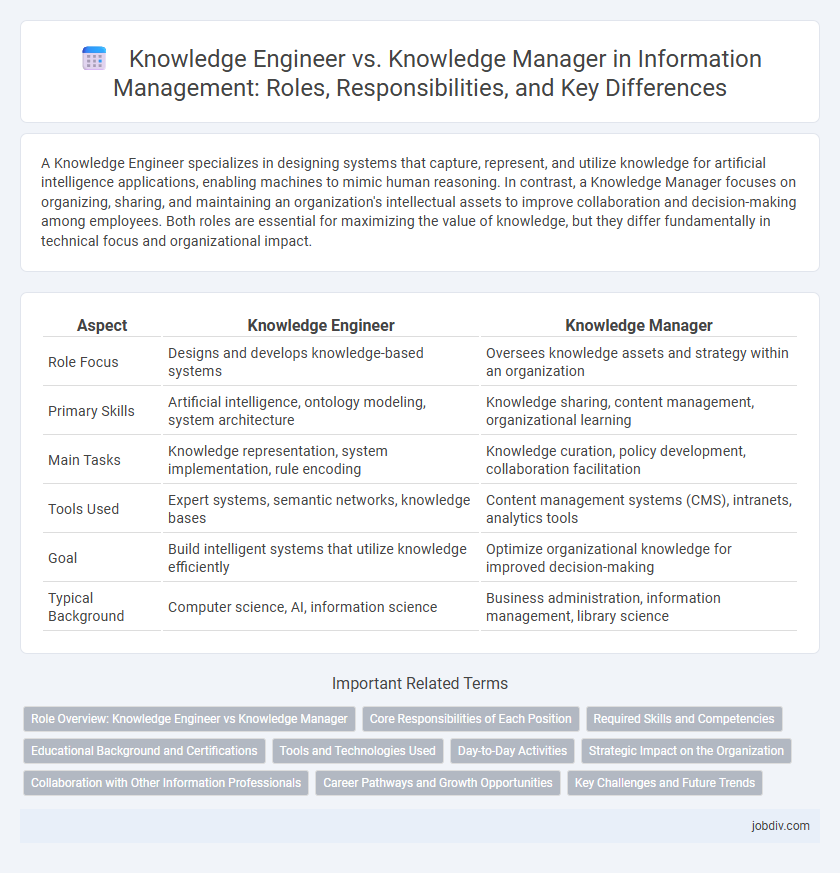A Knowledge Engineer specializes in designing systems that capture, represent, and utilize knowledge for artificial intelligence applications, enabling machines to mimic human reasoning. In contrast, a Knowledge Manager focuses on organizing, sharing, and maintaining an organization's intellectual assets to improve collaboration and decision-making among employees. Both roles are essential for maximizing the value of knowledge, but they differ fundamentally in technical focus and organizational impact.
Table of Comparison
| Aspect | Knowledge Engineer | Knowledge Manager |
|---|---|---|
| Role Focus | Designs and develops knowledge-based systems | Oversees knowledge assets and strategy within an organization |
| Primary Skills | Artificial intelligence, ontology modeling, system architecture | Knowledge sharing, content management, organizational learning |
| Main Tasks | Knowledge representation, system implementation, rule encoding | Knowledge curation, policy development, collaboration facilitation |
| Tools Used | Expert systems, semantic networks, knowledge bases | Content management systems (CMS), intranets, analytics tools |
| Goal | Build intelligent systems that utilize knowledge efficiently | Optimize organizational knowledge for improved decision-making |
| Typical Background | Computer science, AI, information science | Business administration, information management, library science |
Role Overview: Knowledge Engineer vs Knowledge Manager
Knowledge Engineers specialize in designing, developing, and maintaining knowledge-based systems using artificial intelligence to enhance decision-making processes. Knowledge Managers focus on organizing, sharing, and optimizing an organization's knowledge assets to improve collaboration and knowledge retention. The Knowledge Engineer's role is technical and system-driven, while the Knowledge Manager's role emphasizes strategic knowledge flow and organizational learning.
Core Responsibilities of Each Position
Knowledge Engineers specialize in designing, developing, and maintaining knowledge-based systems, focusing on knowledge representation, ontology building, and ensuring the accuracy of information within AI and expert systems. Knowledge Managers concentrate on the strategic acquisition, organization, and dissemination of knowledge across an organization to enhance collaboration, innovation, and decision-making processes. Both roles aim to optimize knowledge utilization but differ in technical execution versus organizational strategy.
Required Skills and Competencies
Knowledge Engineers require advanced expertise in artificial intelligence, data modeling, and ontology development to design and implement knowledge-based systems. Knowledge Managers focus on organizational skills, information governance, and strategic planning to oversee knowledge sharing and retention processes. Both roles demand strong analytical thinking, but Knowledge Engineers emphasize technical proficiency while Knowledge Managers prioritize interpersonal and leadership capabilities.
Educational Background and Certifications
A Knowledge Engineer typically holds a degree in computer science, information technology, or artificial intelligence, often supplemented with certifications in knowledge-based systems, ontology engineering, or data science. In contrast, a Knowledge Manager usually has an educational background in business administration, information management, or library science, combined with certifications such as Certified Knowledge Manager (CKM) or project management credentials. Both roles emphasize specialized training but differ in focus: engineers prioritize technical system design, while managers concentrate on organizational knowledge strategy and governance.
Tools and Technologies Used
Knowledge Engineers primarily use semantic web technologies, ontology editors like Protege, and knowledge representation languages such as OWL and RDF to design and implement knowledge bases. Knowledge Managers utilize collaborative platforms, content management systems (CMS), and data analytics tools to organize, share, and analyze organizational knowledge. Both roles increasingly rely on AI-powered tools and knowledge graphs to enhance knowledge discovery and integration.
Day-to-Day Activities
Knowledge Engineers design, develop, and maintain knowledge-based systems by structuring and encoding information to improve decision-making and automate processes. Knowledge Managers oversee the organization's knowledge assets by curating, organizing, and facilitating access to information to enhance knowledge sharing and collaboration. While Knowledge Engineers focus on technical system development, Knowledge Managers concentrate on knowledge lifecycle management and user engagement within the organization.
Strategic Impact on the Organization
A Knowledge Engineer develops AI systems and ontologies that structure organizational knowledge, directly enhancing decision-making accuracy and innovation capabilities. Knowledge Managers oversee the creation, sharing, and retention of knowledge assets, which improves operational efficiency and aligns knowledge initiatives with business objectives. Both roles strategically impact the organization by fostering a culture of continuous learning and enabling data-driven strategies that drive competitive advantage.
Collaboration with Other Information Professionals
Knowledge Engineers collaborate closely with Data Scientists and Software Developers to design and implement knowledge-based systems, ensuring seamless integration of expert insights into technology. Knowledge Managers work alongside Librarians and Content Strategists to organize, categorize, and maintain information repositories that enhance accessibility and usability. Both roles rely on effective communication with Information Architects to align knowledge structures with organizational goals and user needs.
Career Pathways and Growth Opportunities
Knowledge Engineers specialize in designing and implementing knowledge-based systems, focusing on artificial intelligence, data modeling, and ontology development, offering career growth into AI specialist, data architect, or systems analyst roles. Knowledge Managers concentrate on organizing, sharing, and optimizing organizational knowledge assets, advancing toward roles such as Chief Knowledge Officer, knowledge strategist, and organizational development consultant. Both career pathways provide evolving opportunities in technology-driven environments with increasing demand for expertise in digital knowledge management and cognitive computing.
Key Challenges and Future Trends
Knowledge Engineers face key challenges in developing scalable ontologies and ensuring accurate knowledge representation, while Knowledge Managers struggle with integrating diverse information systems and fostering organizational knowledge sharing. Future trends indicate increased reliance on artificial intelligence and machine learning to automate knowledge curation and personalized information delivery. Both roles will likely converge with advances in semantic technologies and collaborative platforms to optimize knowledge lifecycle management.
Knowledge Engineer vs Knowledge Manager Infographic

 jobdiv.com
jobdiv.com